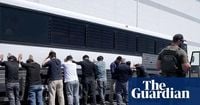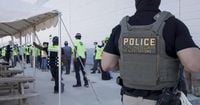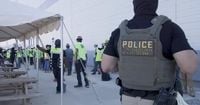On the morning of September 4, 2025, a sense of normalcy at the Hyundai-LG battery plant near Savannah, Georgia, was shattered when agents from Immigration and Customs Enforcement (ICE) descended in force. By the end of the day, more than 300 South Korean workers were under arrest, handcuffed and shackled, their fate uncertain. The incident, which was soon followed by the release of video footage showing workers chained at the hands, ankles, and waists, sent shockwaves through both the United States and South Korea, igniting outrage and raising urgent questions about the future of the U.S.-South Korea alliance.
According to PBS, the few detainees who spoke to reporters described being thrust into cramped quarters where a toilet sat just feet from where they ate and slept. "Their roundup and the U.S. release of video showing some Korean workers shackled with chains around their hands, ankles and waists have caused public outrage and a sense of betrayal in South Korea, a key U.S. ally," PBS reported, relying on Associated Press accounts. The harsh conditions and the images of shackled workers quickly became a rallying point for South Koreans, many of whom have long viewed the United States as a trusted partner.
The scale of the raid was staggering. Industry officials and diplomats told The Atlanta Journal-Constitution that nearly 500 Korean workers were detained at the battery plant construction site, a joint venture between Hyundai and LG Energy Solution. The battery factory, still under construction as of September 2025, was intended to be a cornerstone in Hyundai Motor Group’s ambitious push to expand electric vehicle manufacturing in the United States. The vehicle assembly lines at the adjacent facility had only begun humming a year earlier, in October 2024.
Yet, even before the ICE raid made international headlines, Korean companies were facing persistent issues securing visas for the technical workers essential to building and operating these new plants. Jae Kim, president of the Southeast U.S. Korean Chamber of Commerce, told The Atlanta Journal-Constitution in July 2025 that delays in obtaining foreign visas were making it difficult for firms like Hyundai and SK Battery to ramp up operations. "They were struggling to bring in expertise from Korea for manufacturing, robotics, and automation," Kim said, emphasizing that these challenges were hampering the region’s much-touted manufacturing boom.
The timing of the raid couldn’t have been worse. Just two months earlier, South Korean President Lee Jae Myung had visited the White House, pledging a staggering $350 billion in new U.S. investment to sweeten a trade-and-tariff deal with President Trump. South Korea is not only the United States’ biggest foreign direct investor but also its sixth-largest trading partner, according to CBS. The ICE raid, then, was seen by many as a stinging rebuke at a moment when relations were supposed to be on the upswing.
"The sentiment is obviously very, very negative," James Kim, Chairman and CEO of the American Chamber of Commerce in Seoul, told CBS News. The sense of betrayal was palpable, especially as details began to emerge showing that at least one of the Korean workers detained was in the U.S. legally, with no visa violation. Despite this, officials "mandated that he agree to be removed from the U.S.," according to an internal federal government document obtained by The Guardian. Immigration attorney Charles Kuck was blunt: "It is illegal to detain a valid visa holder in the U.S."
The legal gray area surrounding the raid only deepened tensions. South Korean economic leaders have long pushed for the United States to reform its visa system for foreign workers, especially as Korean companies continue to invest heavily in America. The current system, they argue, is out of step with the realities of global manufacturing, where specialized expertise is needed on tight timelines.
South Korean lawmakers, incensed by the treatment of their nationals, demanded reciprocal investigations into every U.S. citizen teaching English in South Korea who might be working illegally on a tourist visa. Lawmaker Kim Joon-hyun asked pointedly, "Are we giving our money, technology, and investment to the United States only to be treated like this?" CBS reported that such calls for retaliation have only exacerbated the diplomatic strain.
The local political context in Georgia adds yet another layer of complexity. Governor Brian Kemp has spent years cultivating ties with Korean investors, hoping to transform the state into a hub for advanced manufacturing. Yet, Kemp has also been a target of former President Trump’s ire, particularly after refusing to overturn Georgia’s 2020 election results. Some observers have speculated about the timing of the raid, wondering whether it reflects broader partisan dynamics at play—though concrete evidence for such claims remains elusive.
Protests broke out in South Korea on September 9, 2025, near the U.S. Embassy in Seoul. Demonstrators held signs reading "A tariff bomb and workers confinement," as reported by The Atlanta Journal-Constitution. The images of the protest underscored the depth of anger and disappointment among ordinary South Koreans, many of whom had viewed the Hyundai plant as a symbol of international cooperation and economic growth.
Industry leaders and local officials in Georgia have tried to contain the fallout. The Georgia Department of Economic Development issued a statement reaffirming the importance of the state’s relationship with South Korea and emphasizing that "prospective partnerships remain strong." Still, the episode has left many business leaders shaken. Thomas Byrn, CEO of the Korean Society, told The Atlanta Journal-Constitution, "Now they don’t feel supported, they feel anger."
Meanwhile, the Biden administration faces mounting pressure to address the flaws in the U.S. visa system. The raid has become a flashpoint for broader debates about immigration reform, worker mobility, and the future of America’s role in the global economy. Polls cited by Professor John Tures of LaGrange College show that a majority of Americans disapprove of ICE’s tactics, suggesting that public opinion may be shifting against heavy-handed enforcement.
The story of the Hyundai-LG plant raid is, in many ways, a microcosm of the challenges facing the U.S.-South Korea alliance in an era of economic interdependence and political uncertainty. As both countries grapple with the fallout, one thing is clear: trust, once broken, is not easily restored. The coming months will test the resilience of a partnership that has shaped the fortunes of both nations for decades.




